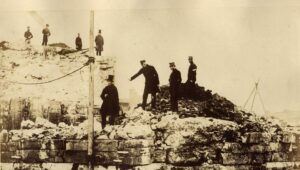- 01843 834160
- [email protected]
- Mon - Fri: 9:00 - 17:00
Gritter Garbo is the star of Hampshire Highways’ winter maintenance fleet

A gritter named by BBC Radio Solent listeners had a special visit this week.
Gritter Garbo was the most popular name chosen by the radio station’s listeners for one of Hampshire County Council’s 43 winter maintenance vehicles.
BBC Radio Solent’s Sasha Twining met up with Councillor Rob Humby, Hampshire County Council’s Executive Member for Environment and Transport, to have a ride on Gritter Garbo at the County Council’s Highways Depot in Bishop’s Waltham.
Cllr Humby said: “It’s been great fun having Radio Solent listeners involved in naming one of our gritters and I was delighted to personally show Sasha the newly named vehicle.
“Hampshire Highways’ gritters are on 24-hour standby, seven days a week, from 1 October right through until the end of April, to deal with winter conditions. We may not see them out on the roads all the time as they’re often working through the night spreading salt ahead of the morning rush hour.”

The public also had the chance to name a gritter via the @hantshighways Twitter feed and the clear winner was Luke Snow Walker!
The state-of-the-art vehicles are fitted with the latest technology to ensure salting is accurate and efficient, and this includes full GPS guidance and automatic salt delivery. The vehicles also have Euro VI efficient engines and dedicated snow ploughs.
Highways teams use detailed Hampshire-specific weather forecasts through the winter period in combination with real time information from a network of electronic roadside weather stations to make decisions about the best time to salt the roads, where to salt and how much salt to use. Forecast road surface and air temperatures, wind speed and direction, rainfall, and ice formation are all important factors in putting the winter fleet to work. Temperatures and conditions can vary significantly even within one county like Hampshire however, so winter teams look at a number of distinct climatic areas to help decide which parts of the road network need to be treated. Roads are normally treated with salt before temperatures drop to freezing to try to stop frost and ice forming.
Highways crews will always salt Hampshire’s main roads first. These ‘Priority one’ routes cover approximately one third of the county road network but carry the majority of Hampshire’s traffic; covering A roads, some B roads, major bus routes, roads to hospitals and other key emergency hubs, large schools and colleges, areas of high traffic concentration and public transport interchanges. During periods of prolonged severe weather, ‘Priority two’ routes, which include remaining B roads and single access roads to villages, may also be treated. Maps of priority gritting routes can be found at: https://maps.hants.gov.uk/
Across Hampshire there are more than 3,000 blue or yellow bins filled with salt and/or grit for use in the community on public roads and pavements. For more information about where these grit bins are, how to get them topped up, how to report a damaged or missing grit bin visit the County Council’s web pages.
Everyone should be ready to adapt the way they drive in winter when the conditions can make driving more hazardous – RoSPA has some helpful winter driving tips.
Follow our ‘gritter twitter’ @HantsHighways to find out when and where the salting lorries are going out, throughout winter.
Keep up to date with articles, news and publications by following us on our social media channels:












